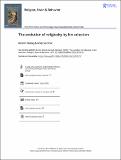Files in this item
The evolution of religiosity by kin selection
Item metadata
| dc.contributor.author | Stucky, Kerstin | |
| dc.contributor.author | Gardner, Andy | |
| dc.date.accessioned | 2022-06-29T16:30:11Z | |
| dc.date.available | 2022-06-29T16:30:11Z | |
| dc.date.issued | 2022-06-10 | |
| dc.identifier | 279489982 | |
| dc.identifier | 92a6be01-44b6-4439-b9fc-6159b88e6d10 | |
| dc.identifier | 85131673515 | |
| dc.identifier | 000809513700001 | |
| dc.identifier.citation | Stucky , K & Gardner , A 2022 , ' The evolution of religiosity by kin selection ' , Religion, Brain & Behavior , vol. Latest Articles . https://doi.org/10.1080/2153599X.2022.2076727 | en |
| dc.identifier.issn | 2153-5981 | |
| dc.identifier.uri | https://hdl.handle.net/10023/25581 | |
| dc.description | Funding: Funding. This research was supported by a Natural Environment Research Council Independent Research Fellowship (grant no. NE/K009524/1) and a European Research Council Consolidator (grant no. 771387). | en |
| dc.description.abstract | Despite religion’s apparent ubiquity, hypotheses about the selection pressures that may have shaped its cognitive foundations remain controversial. Here, we develop and analyse a mathematical model inspired by Crespi and Summers’ suggestion that parent-offspring conflict has driven the evolution of religious beliefs to explore the causes and consequences of these selection pressures. To this end, we employ kin selection methodology to investigate how selection may mould an individual’s propensity for religiosity and corresponding patterns of gene expression, revealing that the evolution of religiosity is modulated by genetic relatedness between social partners, that selection in relation to religiosity may depend on an individual’s age and sex, and that religiosity can foment intragenomic conflicts of interest that give rise to parent-of-origin specific patterns of gene expression and concomitant clinical disorders. More generally, we develop a formal, theoretical framework that enables the derivation of clear-cut, comparative predictions about adaptive as well as maladaptive phenotypes. | |
| dc.format.extent | 18 | |
| dc.format.extent | 2711131 | |
| dc.language.iso | eng | |
| dc.relation.ispartof | Religion, Brain & Behavior | en |
| dc.subject | Evolution | en |
| dc.subject | Genomic imprinting | en |
| dc.subject | Inclusive fitness | en |
| dc.subject | Intragenomic conflict | en |
| dc.subject | Imprinting disorders | en |
| dc.subject | Kin selection | en |
| dc.subject | Neurodevelopmental disorders | en |
| dc.subject | Religion | en |
| dc.subject | BF Psychology | en |
| dc.subject | RC0321 Neuroscience. Biological psychiatry. Neuropsychiatry | en |
| dc.subject | T-NDAS | en |
| dc.subject.lcc | BF | en |
| dc.subject.lcc | RC0321 | en |
| dc.title | The evolution of religiosity by kin selection | en |
| dc.type | Journal article | en |
| dc.contributor.sponsor | NERC | en |
| dc.contributor.sponsor | European Research Council | en |
| dc.contributor.institution | University of St Andrews. School of Biology | en |
| dc.contributor.institution | University of St Andrews. Centre for Biological Diversity | en |
| dc.contributor.institution | University of St Andrews. Institute of Behavioural and Neural Sciences | en |
| dc.contributor.institution | University of St Andrews. St Andrews Bioinformatics Unit | en |
| dc.identifier.doi | 10.1080/2153599X.2022.2076727 | |
| dc.description.status | Peer reviewed | en |
| dc.identifier.grantnumber | NE/K009524/1 | en |
| dc.identifier.grantnumber | 771387 | en |
This item appears in the following Collection(s)
Items in the St Andrews Research Repository are protected by copyright, with all rights reserved, unless otherwise indicated.

